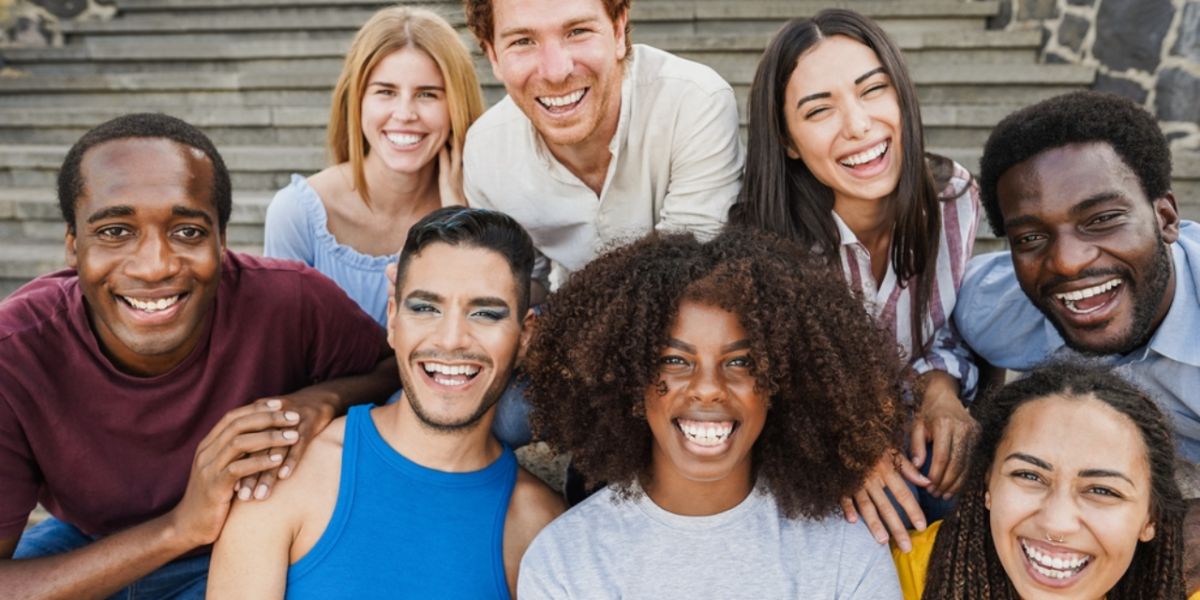
For foreigners arriving in America, understanding the intricate layers of US society and culture can be daunting. Based on the polarized political factions and extremist positions that we hear about on the news, some might come to believe that America is a conservative and xenophobic place. One thing to be aware of is that where you live in America will have a huge impact on whether you encounter progressive or conservative attitudes toward diversity and inclusion. Overall, the US remains one of the more open and diverse societies globally, despite ongoing national and political conflicts over immigration, race, and LGBTQ rights. This guide aims to provide expats with insights into the multifaceted tapestry that is US culture in order to navigate it more easily.
Cultural diversity and immigration in the USA
Despite ongoing political conversations around immigration, there is no denying that the legacy of immigrants in the United States is integral to the nation's identity and progress. Despite facing hurdles like discrimination and integration challenges, immigrants have played pivotal roles in advocating for civil rights, labor rights, and social justice, shaping the nation's values, culture, and cuisine, and essentially making America into the country it is today.
Unfortunately, the political issue of immigration in the USA continues to evoke heated debates and discussions. In 2025, under the Trump presidency, immigration policy has become more restrictive, with tighter border control, fewer pathways to citizenship, and reduced support for migrant aid groups. Discrimination, especially against undocumented individuals, has intensified. ICE raids continue to happen at unprecedented rates, and congress recently approved a whopping $75 billion for ICE over four years, which is has hugely increased its deportation, detention, and enforcement budget
Civil rights in the US and Black Lives Matter
Slavery and segregation are a horrific part of American history that still reverberates in US culture today. Most people are familiar with the most significant step forward for African American rights, the civil rights movement, which happened in the mid-twentieth century. This revolutionary movement aimed to dismantle systemic racism and achieve equal rights for African Americans. It led to legal victories such as the Civil Rights Act of 1964 and the Voting Rights Act of 1965, challenging racial segregation and discrimination. However, the struggle for racial equality persists as racial disparities continue in various areas, including education, employment, and criminal justice. Recent years have seen the rise of the Black Lives Matter (BLM) movement, which advocates against police violence and racial profiling, highlighting the unjust killings of black people. Via protests, education, and social media, BLM has sparked a renewed national conversation on racial injustice, leading to demonstrations, policy reforms, and increased awareness of systemic racism by everyday people. Recently, the US has scaled back funding for civil rights offices across government agencies, and some states have restricted protest rights. In the current environment, BLM remains active but faces increasing political obstacles.
Americans in the US
Native Americans, the original inhabitants of North America, have faced historical injustices and marginalization. In previous centuries, Native Americans were massacred, stripped of their lands, denied their language, and forced onto reservations. There is a growing movement in the United States to uplift Native American cultures, languages, and traditions. However, despite efforts to promote diversity and inclusion, Native Americans continue to grapple with disparities in areas like healthcare, education, and economic opportunities. Unfortunately, recent federal policies have reduced tribal resources and prioritized resource extraction.
LGBTQ+ rights in the US
LGBTQ+ rights in the United States have made significant progress over the past few decades, marked by notable legal and social advancements. The movement for equality gained momentum with milestones like the decriminalization of homosexuality, the removal of "Don't Ask, Don't Tell," and the Supreme Court's legalization of same-sex marriage in 2015. These victories have been considerable strides in recognizing the rights and dignity of the LGBTQ community.
However, the landscape remains complex. Though gay relationships are widely accepted, transgender issues have become a very polarizing topic. In 2025, youth gender medicine was banned in a large number of states, and President Trump has effectively banned transgender people from serving in the military.
Women's rights in the US
Women's rights in the United States have undergone profound transformations throughout history. The struggle for equality gained momentum with the suffrage movement, culminating in the right to vote in 1920. Subsequent decades saw progress in areas such as education, workplace equality, and reproductive rights, symbolized by landmark events like the passage of Title IX and Roe vs. Wade.
However, challenges persist. The gender pay gap, although narrowing, underscores ongoing wage disparities. Women continue to face barriers in leadership roles and political representation. Reproductive rights remain a divisive issue and access to abortion varies state by state. In 2022, widespread state-level abortion bans were introduced when Roe vs. Wade was overturned. Further encroachments on reproductive rights occurred in 2025, with funding cuts to Planned Parenthood and other services.
Religious diversity in the USA
Religious diversity thrives in the United States, supported by laws that uphold freedom of religion. The First Amendment of the Constitution ensures individuals can practice their faith without interference, fostering respect for various beliefs. The nation is home to many religions, including Christianity, Islam, Judaism, Buddhism, Hinduism, Sikhism, and others. Non-religious beliefs and atheism are also respected.
Although many religions are represented in the US, it's also important to note that Christianity is the dominant religion, and around 65 to 70% of Americans identify as Christians, with various denominations including Catholicism, Protestantism, and other Christian groups.
Legal rights in the US
In the United States, a robust legal framework is in place to safeguard equal rights and prevent discrimination. Expats must familiarize themselves with key legal components that uphold diversity and inclusion and understand that they can use the law to protect themselves if facing discrimination.
The Civil Rights Act of 1964 is a pivotal law that prohibits discrimination based on race, color, religion, sex, or national origin in various sectors such as employment, education, and public accommodations. The Equal Employment Opportunity Commission (EEOC) enforces federal laws against workplace discrimination, ensuring fairness in employment based on characteristics like race, gender, religion, national origin, disability, and age.
The Americans with Disabilities Act (ADA) guarantees equal access for individuals with disabilities to public services, accommodations, employment, transportation, and telecommunications. Additionally, Title IX fights gender-based discrimination in education, fostering gender equality.
The Fair Housing Act combats discrimination in housing, protecting against bias related to race, color, religion, sex, national origin, disability, or familial status. Moreover, individual states and localities often have their anti-discrimination laws, so understanding local regulations is vital.
If you encounter discrimination, it's essential to know the reporting process. Typically, this involves filing a complaint with appropriate authorities, such as the EEOC or state human rights agencies. Employers and institutions must address complaints promptly and take necessary steps to prevent further discrimination.
Expats can access legal resources and information related to anti-discrimination laws through libraries, online legal databases, and government websites. Consulting legal professionals can guide rights and address discrimination issues effectively. Understanding these legal protections and anti-discrimination laws ensures expats are well-informed participants in maintaining an equitable and inclusive society. Adhering to these laws not only supports a fair environment but also empowers individuals to take action against discrimination when needed.
Diversity training in the American workplace
Until recently, expats working in American companies might have encountered Diversity, Equity, and Inclusion (DEI) training as part of their professional development, a learning program that helps people understand and respect differences in the workplace. However, in 2025, federal DEI programs have been banned, and many companies have scaled back their work in this space. Again, this varies state by state – some states support DEI and others restrict it.
Diverse states in America
In America, the cultural makeup of cities and states can vary hugely. Several states in the United States are known for their overall diversity. Remember that diversity can encompass various aspects, including racial, ethnic, cultural, and economic diversity. Here are some states that often rank high in terms of diversity:
- Hawaii: With a significant Asian, Pacific Islander, and Native Hawaiian population, Hawaii is known for its rich cultural mix and ethnic diversity.
- California: California is one of the most diverse states in the US, boasting large Hispanic, Asian, and African American communities, as well as a variety of cultures from around the world.
- Texas: Texas is known for its Hispanic population, particularly along the US-Mexico border. It's also home to various communities from different ethnic backgrounds.
- New York: As mentioned earlier, New York state is a melting pot of cultures and ethnicities, particularly in cities like New York City.
- Nevada: The state's diversity is reflected in its urban centers like Las Vegas, which attract people from all over the world.
- New Jersey: New Jersey's proximity to New York City and Philadelphia contributes to its multicultural population.
- Illinois: The diversity of Chicago and its suburbs contributes to the state's overall cultural mix.
- Florida: Florida's diversity is influenced by its large Hispanic population, particularly in cities like Miami.
- Maryland: Proximity to Washington, DC, and its status as a hub for international organizations contribute to its cultural diversity.
- Washington: The state's tech industry attracts people worldwide, contributing to its diverse population.
These states have gained a reputation for their diverse communities and cultural inclusivity. However, diversity is present throughout the country, and every state has its unique blend of cultures, backgrounds, and traditions. If you are coming from a particular country and hoping to encounter your own culture in the US, make sure to do some research first to find out if there is a strong presence in the US city you are considering moving to.
We do our best to provide accurate and up to date information. However, if you have noticed any inaccuracies in this article, please let us know in the comments section below.








